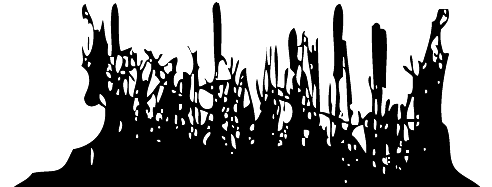Episode 6: Chitimacha
Director: Michelle Smith
“I think extinct in my mind means no hope and totally gone forever. And I don’t think that our language is gone if there is a hope of resurrecting it. And people who still remember it. So we choose to use the word sleeping and now we are going to try to wake it up.” – Kim Walden, Chitimacha Cultural Director
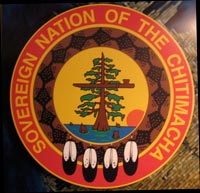
The Chitimacha Nation of Charenton, Louisiana partners with Rosetta Stone, a language learning software company, to create teaching aids for a language that has no fluent speakers. Piecing together the language from old, wax cylinder recordings, this 1,000 member strong community is relying on its determination and thriving cultural identity to awaken the Chitimacha language from its long slumber.
Part 1
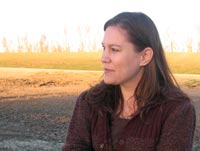 The Chitimacha language is a unique language related to no other in the world. It is also considered extinct, since the last fluent speaker died in 1940. But Kim Walden, cultural director for the tribe, has a more optimistic outlook on the future of the language. She is at the forefront of an effort to revive the Chitimacha language using modern technology.
The Chitimacha language is a unique language related to no other in the world. It is also considered extinct, since the last fluent speaker died in 1940. But Kim Walden, cultural director for the tribe, has a more optimistic outlook on the future of the language. She is at the forefront of an effort to revive the Chitimacha language using modern technology.
The journey of reviving the language began in 1986 when the community received a package of Chitimacha language recordings from the Library of Congress. Recorded onto wax cylinders by linguist Morris Swadesh in the early 1930s, the recordings included hours of legends and stories told mostly by former chief, Benjamin Paul. With these recordings, and the assistance of linguists, the Chitimacha community began rebuilding their language.
Part 2
“We try to mimic that process of learning a first language by using technology…Just like when we were children and we were beginning to learn our first words. Our parent or mother would point to an object say certain things but it was always associated with something visual for the child.” Marion Bittinger, Manager of Rosetta Stone Endangered Language Program
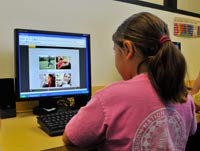 Chitimacha language classes are now offered for children, from daycare to Grade 8, and for adults. Searching for new ways to complement their language curriculum, the community has turned to technology, and more specifically, Rosetta Stone, a language learning software company. Kim has worked on the Rosetta Stone project fulltime for over two years and she's mobilized hundreds of members to participate in the project. Chitimacha teachers Sandra Boutte and Rachel Vilcan have recorded their voices for the software. And hundreds of community members volunteered for photos that will be used to customize the images for the software.
Chitimacha language classes are now offered for children, from daycare to Grade 8, and for adults. Searching for new ways to complement their language curriculum, the community has turned to technology, and more specifically, Rosetta Stone, a language learning software company. Kim has worked on the Rosetta Stone project fulltime for over two years and she's mobilized hundreds of members to participate in the project. Chitimacha teachers Sandra Boutte and Rachel Vilcan have recorded their voices for the software. And hundreds of community members volunteered for photos that will be used to customize the images for the software.
Part 3
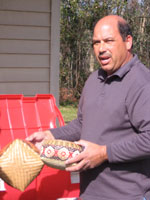 “I'll be long gone and my great grandchildren, my great-great grandchildren, they will be able to hear my voice. And I’m proud they will be able to see that.” - John Paul Darden, basket weaver and nephew of former chief, Benjamin Paul
“I'll be long gone and my great grandchildren, my great-great grandchildren, they will be able to hear my voice. And I’m proud they will be able to see that.” - John Paul Darden, basket weaver and nephew of former chief, Benjamin Paul
John Paul Darden is a skilled basket weaver carrying on the Chitimacha tradition of basket weaving from Rivercane. He is also one of the voicers for the Rosetta Stone software. The original wax cylinder recordings were voiced by his uncle Ben and aunt Delphine 80 years ago. John’s thankful they took the time to make the recordings and pleased that he also has the opportunity to share his voice with future generations.
